How much pain are we in?
Pain-related sleep loss is a real thorn in the side of most adults in America. The 2015 Sleep in AmericaTM Poll found that 21% of Americans experience chronic pain. It also found that 36% of people have experienced acute pain in the last week.
The bottom line? It indicates that more people were in pain than weren’t in pain within the last week. If you are reading this, you are likely in the majority (pain) category.
The question is why we are in so much pain. Some common factors crop up:
- Desk jobs (sitting all day) is not good for our health
- We are spending record amounts of time sitting in front of screens rather than being active
- We have an epidemic of obesity, and weight is a strong contributing factor to chronic pain
- Stress is a considerable factor in people’s lives and also is a strong contributor to pain
- Sports and high activity leads to injuries
- Finally, some of us are unlucky with genetics and inherit weak backs, necks, knees, etc.
The question is, beyond being a nuisance in your life, what else is wrong with pain?
Why being in pain matterns
Pain matters for several reasons:
- Your happiness levels
- Staying active
- Managing stress
- Motivation
When you are in chronic or acute pain, it’s much harder to be happy, stay motivated, manage stress, and stay active. Very importantly, the vicious cycle of being in pain is how it impact sleep. It’s a vicious cycle because pain makes you lose sleep, and loss of sleep can deeply impact your well-being in a negative way, particularly happiness, staying active, staying motivated, and managing stress (37% of people with chronic pain reported elevated stress level compared to 7% of pain-free people who reported the same).
How does pain impact sleep?
Based on the above linked survey, there are two startling results for people who live with pain:
- People with chronic pain had an average nightly sleep debt of 42 minutes (i.e. getting 42 minutes less sleep than they should)
- People with acute pain in the last week had an average sleep debt of 14 minutes
The point here is that there is a direct link between pain and sleep loss. Let’s compare this to people who aren’t in pain, based on the survey:
- 65% of people with no pain reported good or very good sleep quality
- 45% of people with acute pain in the last week reported good or very good sleep quality
- 37% of people with chronic pain in the last week reported good or very good sleep quality
Not only does pain cause you to sleep less, but it impacts the quality of sleep as well. This seems to be particularly true in the case of chronic pain. As an aside, 23% of people with chronic pain reported being diagnosed with a sleep disorder by a doctor, compared to just 6% of pain free people. It’s quite a sobering statistic.

What to do if you have chronic pain?
Though you might not be able to take away the pain, there are main steps you can take to help improve your chances of getting a restful night’s sleep. Here are some good examples:
- Cut alcohol in the hours leading up to bed
- Limit caffeine consumption as much as possible
- Don’t drink caffeine after noon
- Be extremely careful using pain killer or sleeping pills, as they significantly aggravate certain sleeping disorders
- Practice relaxation techniques before bed, such as yoga, meditation, or breathing exercises
- Find high-energy exercises that you CAN do with little pain, such as swimming, cycling, running, and Pilates
- Try and eat a healthy diet
Doing all of these can make a huge difference in your sleep time and quality, especially if you have chronic pain.
If you live in Alaska, have pain, and can’t seem to sleep no matter what you do, please reach out to us by taking this free sleep survey.


